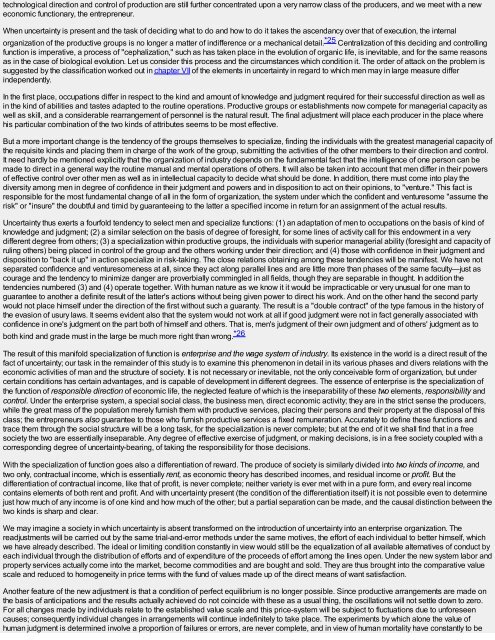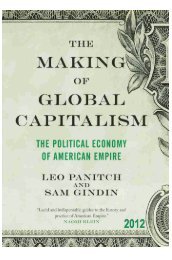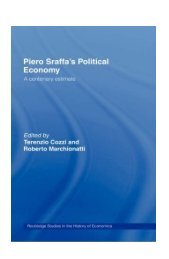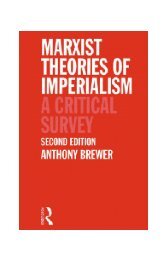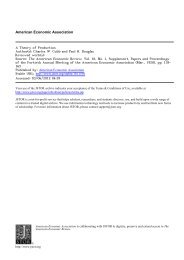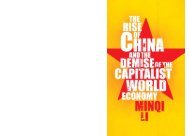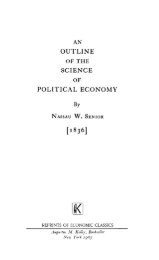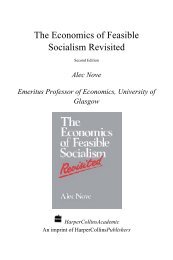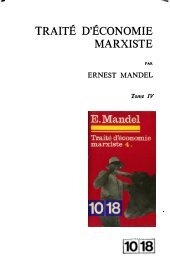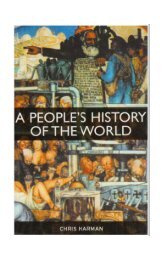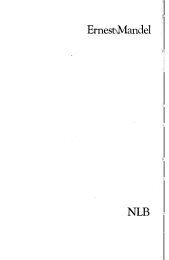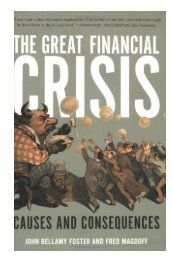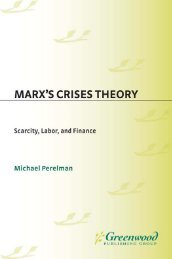Part III, Chapter IXEnterprise <strong>and</strong> <strong>Profit</strong>We must now consider more concretely <strong>and</strong> in detail the effects of uncertainty on the general form of organization of economic life. The bestmethod seems to be to take up a society in which uncertainty is absent, imagine uncertainty introduced, <strong>and</strong> try to ascertain what changes will takeplace in its structure. We therefore return to the argument of chapter IV in which the mechanics of exchange <strong>and</strong> competition were studied withuncertainty (<strong>and</strong> progress) absent. The same method will be followed, beginning with the problem in as simple a form as possible <strong>and</strong> studying theeffects of different factors separately, analyzing the complexity of real life "synthetically" by building it up in imagination out of its elements.To secure the minimum degree of uncertainty <strong>and</strong> at the same time keep the discussion as close to reality as possible, it is necessary to exercisesome care in defining the assumptions with which we are working. The most obvious initial requirement is to eliminate the factors of socialprogress from consideration <strong>and</strong> consider first a static society. But this postulate calls for discrimination in h<strong>and</strong>ling. In an absolutely unchangingsocial life there would, as we have repeatedly observed, be no uncertainty whatever, <strong>and</strong> our analysis in chapter IV proceeded on this assumption.Such conditions are thoroughly incompatible with the most fundamental facts of the world in which we live, but their study serves the analyticpurpose of isolating the effects of uncertainty. For different kinds of change <strong>and</strong> different degrees of change are real facts, <strong>and</strong> it will thereforeinvolve less abstraction to study hypothetical conditions under which change is restricted to the most fundamental <strong>and</strong> ineradicable kind <strong>and</strong>amount. Societies may be <strong>and</strong> have been nearly unprogressive, <strong>and</strong> the obvious simplification to make is therefore the elimination of progressivechange.After abstracting all the elements of general progressive change enumerated in chapter V a large amount of uncertainty will be left in human life,due to changes of the character of fluctuations which cannot be thought away without violence to material possibility. Strictly accurate formulation ofconditions involving a realistic minimum of uncertainty cannot be made, but are not necessary; it is sufficient to indicate in a rough way the situationwe propose to discuss. Several factors affect the amount of uncertainty to be recognized, <strong>and</strong> have to be taken into account. The first to be noted isthe time length of the production process, for the longer it is, the more uncertainty will naturally be involved. Of very great importance also is thegeneral level of economic life. The lower wants of man, those having in the greatest degree the nature of necessities, are the most stable <strong>and</strong>predictable. The higher up the scale we go, the larger the proportion of the æsthetic element <strong>and</strong> of social suggestion there is involved inmotivation, the greater becomes the uncertainty connected with foreseeing wants <strong>and</strong> satisfying them. On the production side, on the other h<strong>and</strong>,most manufacturing processes are more controllable <strong>and</strong> calculable as to outcome than are agricultural operations under usual conditions. Wemust notice also the development of science <strong>and</strong> of the technique of social organization. Greater ability to forecast the future <strong>and</strong> greater power tocontrol the course of events manifestly reduce uncertainty, <strong>and</strong> of still greater importance is the status of the various devices noted in the lastchapter for reducing uncertainty by consolidation.All these perplexities about which some more or less definite assumption must be made can be disposed of by being as realistic as possible. Letus say simply that we are talking about the United States in the early years of the twentieth century, but with abstraction made of progressivechanges. That is, we assume a population static in numbers <strong>and</strong> composition <strong>and</strong> without the mania of change <strong>and</strong> advance which characterizesmodern life. Inventions <strong>and</strong> improvements in technology <strong>and</strong> organization are to be eliminated, leaving the general situation as we know it to-day toremain stationary. Similarly in regard to the saving of new capital, development of new natural resources, redistribution of population over the soil orredistribution of ownership of goods, education, etc., among the people. But we shall not assume that men are omniscient <strong>and</strong> immortal or perfectlyrational <strong>and</strong> free from caprice as individuals. We shall neglect natural catastrophes, epidemics, wars, etc., but take for granted the "usual"uncertainties of the weather <strong>and</strong> the like, along with the "normal" vicissitudes of mortal life, *23 <strong>and</strong> uncertainties of human choice.Returning now to the kind of social organization described in chapter IV, *24 let us inquire as to what will be the effects of introducing the minimumdegree of uncertainty into the situation. The essential features of the hypothetical society as thus far constructed need to be kept clearly in mind.Acting as individuals under absolute freedom but without collusion, men are supposed to have organized economic life with primary <strong>and</strong> secondarydivision of labor, the use of capital, etc., developed to the point familiar in present-day America. The principal fact which calls for exercise of theimagination is the internal organization of the productive groups or establishments. With uncertainty entirely absent, every individual being inpossession of perfect knowledge of the situation, there would be no occasion for anything of the nature of responsible management or control ofproductive activity. Even marketing operations in any realistic sense would not be found. The flow of raw materials <strong>and</strong> productive services throughproductive processes to the consumer would be entirely automatic.We do not need to strain the imagination by supposing supernatural powers of prescience on the part of men. We can think of the adjustment asthe result of a long process of experimentation, worked out by trial-<strong>and</strong>-error methods alone. If the conditions of life <strong>and</strong> the people themselves wereentirely unchanging a definite organization would result, perfect in the sense that no one would be under an incentive to change. So in theorganization of the productive groups, it is not necessary to imagine every worker doing exactly the right thing at the right time in a sort of"preëstablished harmony" with the work of others. There might be managers, superintendents, etc., for the purpose of coördinating the activities ofindividuals. But under conditions of perfect knowledge <strong>and</strong> certainty such functionaries would be laborers merely, performing a purely routinefunction, without responsibility of any sort, on a level with men engaged in mechanical operations.With the introduction of uncertainty—the fact of ignorance <strong>and</strong> necessity of acting upon opinion rather than knowledge—into this Eden-like situation,its character is completely changed. With uncertainty absent, man's energies are devoted altogether to doing things; it is doubtful whetherintelligence itself would exist in such a situation; in a world so built that perfect knowledge was theoretically possible, it seems likely that all organicreadjustments would become mechanical, all organisms automata. With uncertainty present, doing things, the actual execution of activity, becomesin a real sense a secondary part of life; the primary problem or function is deciding what to do <strong>and</strong> how to do it. The two most importantcharacteristics of social organization brought about by the fact of uncertainty have already been noticed. In the first place, goods are produced for amarket, on the basis of an entirely impersonal prediction of wants, not for the satisfaction of the wants of the producers themselves. The producertakes the responsibility of forecasting the consumers' wants. In the second place, the work of forecasting <strong>and</strong> at the same time a large part of the
technological direction <strong>and</strong> control of production are still further concentrated upon a very narrow class of the producers, <strong>and</strong> we meet with a neweconomic functionary, the entrepreneur.When uncertainty is present <strong>and</strong> the task of deciding what to do <strong>and</strong> how to do it takes the ascendancy over that of execution, the internalorganization of the productive groups is no longer a matter of indifference or a mechanical detail. *25 Centralization of this deciding <strong>and</strong> controllingfunction is imperative, a process of "cephalization," such as has taken place in the evolution of organic life, is inevitable, <strong>and</strong> for the same reasonsas in the case of biological evolution. Let us consider this process <strong>and</strong> the circumstances which condition it. The order of attack on the problem issuggested by the classification worked out in chapter VII of the elements in uncertainty in regard to which men may in large measure differindependently.In the first place, occupations differ in respect to the kind <strong>and</strong> amount of knowledge <strong>and</strong> judgment required for their successful direction as well asin the kind of abilities <strong>and</strong> tastes adapted to the routine operations. Productive groups or establishments now compete for managerial capacity aswell as skill, <strong>and</strong> a considerable rearrangement of personnel is the natural result. The final adjustment will place each producer in the place wherehis particular combination of the two kinds of attributes seems to be most effective.But a more important change is the tendency of the groups themselves to specialize, finding the individuals with the greatest managerial capacity ofthe requisite kinds <strong>and</strong> placing them in charge of the work of the group, submitting the activities of the other members to their direction <strong>and</strong> control.It need hardly be mentioned explicitly that the organization of industry depends on the fundamental fact that the intelligence of one person can bemade to direct in a general way the routine manual <strong>and</strong> mental operations of others. It will also be taken into account that men differ in their powersof effective control over other men as well as in intellectual capacity to decide what should be done. In addition, there must come into play thediversity among men in degree of confidence in their judgment <strong>and</strong> powers <strong>and</strong> in disposition to act on their opinions, to "venture." This fact isresponsible for the most fundamental change of all in the form of organization, the system under which the confident <strong>and</strong> venturesome "assume therisk" or "insure" the doubtful <strong>and</strong> timid by guaranteeing to the latter a specified income in return for an assignment of the actual results.<strong>Uncertainty</strong> thus exerts a fourfold tendency to select men <strong>and</strong> specialize functions: (1) an adaptation of men to occupations on the basis of kind ofknowledge <strong>and</strong> judgment; (2) a similar selection on the basis of degree of foresight, for some lines of activity call for this endowment in a verydifferent degree from others; (3) a specialization within productive groups, the individuals with superior managerial ability (foresight <strong>and</strong> capacity ofruling others) being placed in control of the group <strong>and</strong> the others working under their direction; <strong>and</strong> (4) those with confidence in their judgment <strong>and</strong>disposition to "back it up" in action specialize in risk-taking. The close relations obtaining among these tendencies will be manifest. We have notseparated confidence <strong>and</strong> venturesomeness at all, since they act along parallel lines <strong>and</strong> are little more than phases of the same faculty—just ascourage <strong>and</strong> the tendency to minimize danger are proverbially commingled in all fields, though they are separable in thought. In addition thetendencies numbered (3) <strong>and</strong> (4) operate together. With human nature as we know it it would be impracticable or very unusual for one man toguarantee to another a definite result of the latter's actions without being given power to direct his work. And on the other h<strong>and</strong> the second partywould not place himself under the direction of the first without such a guaranty. The result is a "double contract" of the type famous in the history ofthe evasion of usury laws. It seems evident also that the system would not work at all if good judgment were not in fact generally associated withconfidence in one's judgment on the part both of himself <strong>and</strong> others. That is, men's judgment of their own judgment <strong>and</strong> of others' judgment as toboth kind <strong>and</strong> grade must in the large be much more right than wrong. *26The result of this manifold specialization of function is enterprise <strong>and</strong> the wage system of industry. Its existence in the world is a direct result of thefact of uncertainty; our task in the remainder of this study is to examine this phenomenon in detail in its various phases <strong>and</strong> divers relations with theeconomic activities of man <strong>and</strong> the structure of society. It is not necessary or inevitable, not the only conceivable form of organization, but undercertain conditions has certain advantages, <strong>and</strong> is capable of development in different degrees. The essence of enterprise is the specialization ofthe function of responsible direction of economic life, the neglected feature of which is the inseparability of these two elements, responsibility <strong>and</strong>control. Under the enterprise system, a special social class, the business men, direct economic activity; they are in the strict sense the producers,while the great mass of the population merely furnish them with productive services, placing their persons <strong>and</strong> their property at the disposal of thisclass; the entrepreneurs also guarantee to those who furnish productive services a fixed remuneration. Accurately to define these functions <strong>and</strong>trace them through the social structure will be a long task, for the specialization is never complete; but at the end of it we shall find that in a freesociety the two are essentially inseparable. Any degree of effective exercise of judgment, or making decisions, is in a free society coupled with acorresponding degree of uncertainty-bearing, of taking the responsibility for those decisions.With the specialization of function goes also a differentiation of reward. The produce of society is similarly divided into two kinds of income, <strong>and</strong>two only, contractual income, which is essentially rent, as economic theory has described incomes, <strong>and</strong> residual income or profit. But thedifferentiation of contractual income, like that of profit, is never complete; neither variety is ever met with in a pure form, <strong>and</strong> every real incomecontains elements of both rent <strong>and</strong> profit. And with uncertainty present (the condition of the differentiation itself) it is not possible even to determinejust how much of any income is of one kind <strong>and</strong> how much of the other; but a partial separation can be made, <strong>and</strong> the causal distinction between thetwo kinds is sharp <strong>and</strong> clear.We may imagine a society in which uncertainty is absent transformed on the introduction of uncertainty into an enterprise organization. Thereadjustments will be carried out by the same trial-<strong>and</strong>-error methods under the same motives, the effort of each individual to better himself, whichwe have already described. The ideal or limiting condition constantly in view would still be the equalization of all available alternatives of conduct byeach individual through the distribution of efforts <strong>and</strong> of expenditure of the proceeds of effort among the lines open. Under the new system labor <strong>and</strong>property services actually come into the market, become commodities <strong>and</strong> are bought <strong>and</strong> sold. They are thus brought into the comparative valuescale <strong>and</strong> reduced to homogeneity in price terms with the fund of values made up of the direct means of want satisfaction.Another feature of the new adjustment is that a condition of perfect equilibrium is no longer possible. Since productive arrangements are made onthe basis of anticipations <strong>and</strong> the results actually achieved do not coincide with these as a usual thing, the oscillations will not settle down to zero.For all changes made by individuals relate to the established value scale <strong>and</strong> this price-system will be subject to fluctuations due to unforeseencauses; consequently individual changes in arrangements will continue indefinitely to take place. The experiments by which alone the value ofhuman judgment is determined involve a proportion of failures or errors, are never complete, <strong>and</strong> in view of human mortality have constantly to be
- Page 2 and 3:
Go To Chapter 1Author's PrefaceTher
- Page 4 and 5:
possible. It is the scientific meth
- Page 6 and 7:
drawn-out redistribution of energy
- Page 8 and 9:
left after (a) interest, (b) insura
- Page 10 and 11: The fatal criticism of this procedu
- Page 12 and 13: sides of the controversy, in assumi
- Page 14 and 15: Part II, Chapter IIIThe Theory of C
- Page 16 and 17: ecause they give rise to no conflic
- Page 18 and 19: credits are equal. There is a sort
- Page 20 and 21: either superabundant, and consequen
- Page 23 and 24: Part II, Chapter IVJoint Production
- Page 25 and 26: on his business. It is obvious that
- Page 27: word "product" in the same meaning
- Page 30 and 31: that the owner of such property may
- Page 32 and 33: consumption, to secure a rising dis
- Page 34 and 35: difference between personal ability
- Page 36 and 37: limits its increase rises at the sa
- Page 38 and 39: amounts of agencies not freely repr
- Page 40 and 41: Part II, Chapter VIMinor Prerequisi
- Page 42 and 43: Clark School. "Monopoly" is a word
- Page 44 and 45: incapable of wielding to his own ad
- Page 46 and 47: automata, but we are not. At least
- Page 48 and 49: The practical limitation of knowled
- Page 50 and 51: to its conclusion, it seems that th
- Page 52 and 53: should regard the probability for h
- Page 54 and 55: themselves into an opinion of a pro
- Page 56 and 57: equally probable alternatives; but
- Page 58 and 59: It is particularly noteworthy that
- Page 62 and 63: ecommenced at the beginning.We turn
- Page 64 and 65: number of times. The allowance for
- Page 66 and 67: Part III, Chapter XEnterprise and P
- Page 68 and 69: esources are placed in an exposed p
- Page 70 and 71: Pure profit is theoretically unimpu
- Page 72 and 73: This distinction is also well recog
- Page 74 and 75: call for the exercise of judgment i
- Page 76 and 77: The uncertainty so far discussed in
- Page 78 and 79: others. It will ordinarily be true
- Page 80 and 81: e a brief examination into the mean
- Page 82 and 83: And this even though the same men k
- Page 84 and 85: economic conduct, and weighed again
- Page 93 and 94: Frank H. Knight, Risk, Uncertainty,
- Page 95 and 96: 18. These national designations of
- Page 97 and 98: dynamic economic changes are of thi
- Page 99 and 100: 2. This is intended as a statement
- Page 101 and 102: of æsthetics (another form of "val
- Page 103 and 104: Economics, vol. XVI, pp. 473 ff.) B
- Page 105 and 106: 57. See chapter VI.58. We may notic
- Page 107 and 108: Economy, pp. 72 ff., where the same
- Page 109 and 110: War, in particular, has wrought cha
- Page 111 and 112:
105. There is one important excepti
- Page 113 and 114:
time tendencies or with "static" ec
- Page 115 and 116:
24. Chapter V, the reader will reca
- Page 117 and 118:
virtue" of opiates. The latter at l
- Page 119:
68. Principles of Economics (1913),


